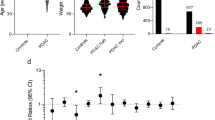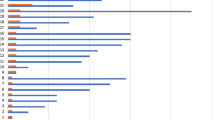Abstract
Background and Aims
The high mortality rate of pancreatic cancer is a bottleneck for further treatment with long-term efficacy. Thus, it is urgent to identify new methods to accurately predict the early onset of pancreatic cancer. We hypothesized that the different genotypes of cationic trypsinogen (PRSS1) gene could confer susceptibility and/or resistance to pancreatic cancer in the Han Chinese population.
Methods
The genotypes of PRSS1 were determined in 154 patients with pancreatic cancer and in a control group of 520 healthy individuals of Han Chinese descent. Clinical information was obtained, single-nucleotide polymorphisms (SNPs) of the PRSS1 gene were analyzed by direct sequencing, and the distribution of the genotypes were tested for Hardy–Weinberg equilibrium. Odds ratios and 95% confidence intervals were calculated by logistic regression analysis to estimate the associations between the different genotypes or haplotypes and the risk of pancreatic cancer.
Results
Three SNPs (−409 C/T, −204 A/C, and c.486 C/T) were identified. A case-control analysis revealed a 0.118-fold (95% CI: 0.037–0.653), 0.842-fold (95% CI: 0.177–4.010), and 0.750-fold (95% CI: 0.519–1.085) change in risk of develo** pancreatic cancer for individuals harboring these SNPs, respectively. The individuals with the −409 C/T genotype tended to have a reduced risk compared to those who carried the −409 T/T genotype. A protective effect was observed for the C−409–A−204–C486 haplotype compared to the T−409–A−204–T486 haplotype (OR = 0.115, 95% CI: 0.016–0.849) or compared to the T−409–A−204–C486 haplotype (OR = 0.090, 95% CI: 0.012–0.667). Serum levels of trypsin in patients with the −409 C/T genotype were only one-fourth that of those with the −409 T/T genotype and only one-third that of the healthy controls.
Conclusions
The −409 C/T genotype of PRSS1 was reveled to be a protective factor against pancreatic cancer in the Han Chinese population.



Similar content being viewed by others
References
Tersmette AC, Petersen GM, Offerhaus GJ, et al. Increased risk of incident pancreatic cancer among first-degree relatives of patients with familial pancreatic cancer. Clin Cancer Res. 2001;7:738–744.
Eberle MA, Pfutzer R, Pogue-Geile KL, et al. A new susceptibility locus for autosomal dominant pancreatic cancer maps to chromosome 4q32–34. Am J Hum Genet. 2002;70:1044–1048.
van der Heijden MS, Yeo CJ, Hruban RH, Kern SE. Fanconianemia gene mutations in young-onset pancreatic cancer. Cancer Res. 2003;63:2585–2588.
Cox B, Waisfisz Q, Die-Smulders C, et al. Biallelic inactivation of BRCA2 in fanconianemia. Science. 2002;297:606–609.
Murphy KM, Brune KA, Griffin C, et al. Evaluation of candidate genes MAP2K4, MADH4, ACVR1B and BRCA2 in familial pancreatic cancer: deleterious BRCA2 mutations in 17%. Cancer Res. 2002;62:3789–3793.
Jemal A, Siegel R, Ward E, et al. Cancer statistics 2007. CA Cancer J Clin. 2007;57:43–66.
Zogopoulos G, Rothenmund H, Eppel A, et al. The P239S palladin variant does not account for a significant fraction of hereditary or early onset pancreas cancer. Hum Genet. 2007;121:635–637.
Rulyak SJ, Lowenfels AB, Maisonneuve P, Brentnall TA. Risk factors for the development of pancreatic cancer in familial pancreatic cancer kindred’s. Gastroenterology. 2003;124:1292–1299.
Ikeda O, Egami H, Ishiko T, Ishikawa S, et al. Signal of proteinase-activated receptor-2 contributes to highly malignant potential of human pancreatic cancer by up-regulation of interleukin-8 release. Int J Oncol. 2006;28:939–946.
Rebours V, Boutron-Ruault MC, Schnee M, et al. Risk of pancreatic adenocarcinoma in patients with hereditary pancreatitis: a national exhaustive series. Am J Gastroenterol. 2008;103:111–119.
Hengstler JG, Bauer A, Wolf HK, et al. Mutation analysis of the cationic trypsinogen gene in patients with pancreatic cancer. Anticancer Res. 2000;20:2967–2974.
Farrow B, Evers BM. Inflammation and the development of pancreatic cancer. Surg Oncol. 2002;10:153–169.
Chen JM, Férec C. Chronic pancreatitis: genetics and pathogenesis. Annu Rev Genomics Hum Genet. 2009;10:63–87.
Liu QC, Gao F, Ou QS, et al. Novel mutation and polymorphism of PRSS1 gene in the Chinese patients with hereditary pancreatitis and chronic pancreatitis. Chin Med J. 2008;121:108–111.
Jemal A, Siegel R, Ward E, et al. Cancer statistics 2008. CA Cancer J Clin. 2008;58:71–96.
Szmola R, Sahin-Tóth M. Uncertainties in the classification of human cationic trypsinogen (PRSS1) variants as hereditary pancreatitis-associated mutations. J Med Genet. 2010;47:348–350.
Rebours V, Lévy P, Mosnier JF, et al. Pathology analysis reveals that dysplastic pancreatic ductal lesions are frequent in patients with hereditary pancreatitis. Clin Gastroenterol Hepatol. 2010;8:206–212.
Chen JM, Le Mar’echal C, Lucas D, et al. Loss-of-function mutations in the cationic trypsinogen gene (PRSS1) may act as a protective factor against pancreatitis. Mol Genet Metab. 2003;79:67–70.
Witt H, Sahin-Toth M, Landt O, et al. A degradation-sensitive anionic trypsinogen (PRSS2) variant protects against chronic pancreatitis. Nat Genet. 2006;38:668–673.
Jiao L, Bondy ML, Hassan MM, et al. Glutathione S-transferase gene polymorphisms and risk and survival of pancreatic cancer. Cancer. 2007;109:840–848.
Ducroc R, Bontemps C, Marazova K, et al. Trypsin is produced by and activates protease-activated receptor-2 in human cancer colon cells: evidence for new autocrine loop. Life Sci. 2002;270:1359–1367.
Shimamoto R, Sawada T, Uchima Y, et al. A role for protease-activated receptor-2 in pancreatic cancer cell proliferation. Int J Oncol. 2004;24:1401–1406.
Lowenfels AB, Maisonneuve P, Whitcomb DC, et al. Cigarette smoking as a risk factor for pancreatic cancer in patients with hereditary pancreatitis. JAMA. 2001;286:169–170.
Rulyak SJ, Lowenfels AB, Maisonneuve P, Brentnall TA. Risk factors for the development of pancreatic cancer in familial pancreatic cancer kindred’s. Gastroenterology. 2003;124:1292–1299.
Huxley R, Ansary-Moghaddam A, Berrington DG, et al. Type-II diabetes and pancreatic cancer: a meta-analysis of 36 studies. Br J Cancer. 2005;92:2076–2083.
Chari ST, Leibson CL, Rabe KG, et al. Probability of pancreatic cancer following diabetes: a population-based study. Gastroenterology. 2005;129:504–511.
Liu QC, Zhuang ZH, Zeng K, et al. Prevalence of pancreatic diabetes in patients carrying mutations or polymorphisms of the PRSS1 gene in the Han population. Diabetes Technol Ther. 2009;11:799–804.
Howes N, Lerch MM, Greenhalf W, et al. Clinical and genetic characteristics of hereditary pancreatitis in Europe. Clin Gastroenterol Hepatol. 2004;2:252–261.
Lowenfels AB, Maisonneuve P, Whitcomb DC, et al. Cigarette smoking as a risk factor for pancreatic cancer in patients with hereditary pancreatitis. J Am Med Assoc. 2001;286:169–170.
Dale V, Paula G, Eithne C, John N. Genetics and prevention of pancreatic cancer. Cancer Control. 2004;11:6–14.
Whitcomb DC. Genetic aspects of pancreatitis. Annu Rev Med. 2010;61:413–424.
Rebours V, Boutron-Ruault MC, Schnee M, et al. Risk of pancreatic adenocarcinoma in patients with hereditary pancreatitis: a national exhaustive series. Am J Gastroenterol. 2008;103:111–119.
Berndt C, Haubold K, Wenger F, et al. k-ras mutations in stools and tissue samples from patients with malignant and nonmalignant pancreatic diseases. Clin Chem. 1998;44:2103–2107.
Tang Z, Geng G, Huang Q, et al. Prognostic significance of tissue factor pathway inhibitor-2 in pancreatic carcinoma and its effect on tumor invasion and metastasis. Med Oncol. 2010;27:867–875.
Caruso R, Pallone F, Fina D, et al. Protease-activated receptor-2 activation in gastric cancer cells promotes epidermal growth factor trans-activation and proliferation. Am J Pathol. 2006;169:268–278.
Ossovskaya VS, Bunnett NW. Protease-activated receptors: contribution to physiology and disease. Physiol Rev. 2004;84:579–621.
Grocock CJ, Rebours V, Delhaye MN, et al. The variable phenotype of the p. A16V mutation of cationic trypsinogen (PRSS1) in pancreatitis families. Gut. 2010;59:357–363.
Dong X, Jiao L, Li Y, et al. Significant Associations of mismatch repair gene polymorphisms with clinical outcome of pancreatic cancer. J Clin Oncol. 2009;27:1592–1599.
Pickering BM, Willis AE. The implications of structured 5′ untranslated regions on translation and disease. Semin Cell Dev Biol. 2005;16:39–47.
Acknowledgments
Financial support from the Project Foundation of Fujian Provincial Education (JA10143), National High Technology Investigation Project Foundation of China (2008AA02Z433), National Natural Science Foundation of China (20975021, 20805006), and the Major Program Foundation of Fujian Medical University (09ZD013) is greatly acknowledged.
Conflict of interest
None.
Author information
Authors and Affiliations
Corresponding author
Rights and permissions
About this article
Cite this article
Liu, Q., Lin, X., Liu, J. et al. The −409 C/T Genotype of PRSS1 Protects Against Pancreatic Cancer in the Han Chinese Population. Dig Dis Sci 57, 573–579 (2012). https://doi.org/10.1007/s10620-011-1893-6
Received:
Accepted:
Published:
Issue Date:
DOI: https://doi.org/10.1007/s10620-011-1893-6




